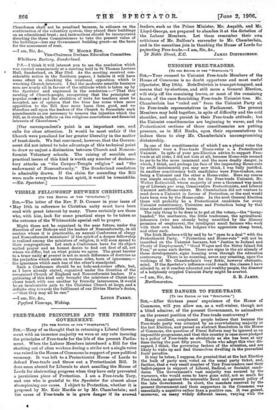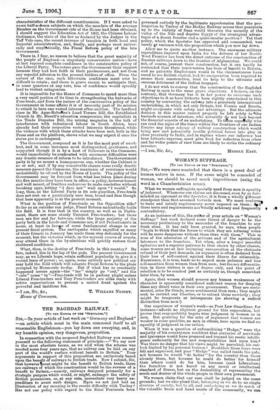THE DANGER TO FREE-TRADE.
[To THE EDITOR OF THE " SPECTATOR."3
SIR,—After thirteen years' experience of the House of
Commons, will you allow me, as a well-wisher, though not a blind admirer, of the present Government, to animadvert on the present position of the Free-trade controversy ?
Many excellent, complacent people believe that because the Free-trade party was returned by an overwhelming majority at the last Election, and passed an abstract Resolution in the House of Commons, the question of Fiscal Reform may be ignored as an impossible programme, and that this country is once more pledged to a policy of Free-trade as absolutely as she has been at any time during the past fifty years. Those who adopt this view dis- regard, I think, the governing factors of the situation, and are likely to wake up and find themselves dwelling in the proverbial fools' paradise. It may be taken, I suppose, for granted that at the last Election the bulk of party men voted on the usual party ticket, and, further, that a very small number of Tory Free-traders cast their ballot-papers in support of Liberal, Radical, or Socialist candi- dates. The Government's vast majority was secured by the waverers, who would seem to have gone solid, not so much for Free-trade, as against the miserable fiscal and general policy of the late Government. In short, the mandate received by the present Government and their supporters in the Commons was essentially a negative rather than a positive one. It was gained, moreover, on many widely different issues, varying with the charactelistics of the different constituencies. If I were asked to name half-a-dozen subjects on which the mandate of the average Member on the Government side of the House had. been obtained, I should suggest the Education Act of 1902, the Chinese Labour Ordinance, the state of the law as declared by the Judges in the Taff Vale case, the recent increase of taxation in both local and Imperial administration, and, finally, and perhaps most univer- sally and emplffitically, the Fiscal Reform policy of the late
Government. •
There is, I fear, no reason to believe that the great majority of the people of England—a singularly conservative nation —have at last reposed complete confidence in the constructive policy of the Liberal Party. The voters gave the Government their support because they had lost faith in their predecessors, and not from any especial adhesion to the present holders of office. From the nature of the case, such lukewarm confidence must over be difficult to retain ; and there is grave reason to anticipate that,
• in some quarters at any rate, loss of confidence would speedily lead to violent antagonism. • It is impossible for the House of Commons to spend more than a very small portion of its time in strengthening the bulwarks of Free-trade, and from the nature of the constructive policy of the Government in home affairs it is of necessity part of its mission to attack in turn one vested interest after another. The landlord class in Mr. Agar-Robaftes's Land Tenure Bill, the Established Church in Mr. Birrell's education compromise, the capitalists in the Trade Disputes Bill, the mining magnates in the talk of interference with indentured labour in South Africa, have already had their respective vested interests threatened, while the violence with which these attacks have been met, both in the Press and on the platform, shows what we may expect if once the status quo is endangered.
The Government, composed as it is for the most part of excel- lent, and in some instances most distinguished, gentlemen, and supported though it is by a host of followers in the Commons, would immediately be confronted with enormous difficulties were any drastic measure of reform to be introduced. The Government party is by no means a homogeneous one, whether the Cabinet is so or not; and if by any conceivable chance some really drastic measure passed the Commons, the maximum of resistance would undoubtedly be offered by the House of Lords. The policy of the Government may be forecast from what has taken place during the five months they have been in office,—a policy, however honest and well meant, of fruitless endeavour to make omelettes without breaking eggs, letting "I dare not" wait upon "I would." So long, then, as the Liberal Party is its sole guardian, Free-trade does not rest on a particularly sure base, broad and firm though that base apparently is at the present moment.
What is the position of Free-trade on the Opposition side ? So far as an outsider can judge, Fiscal Reform undoubtedly holds the field. It is true that in the country, as well as in Parlia- ment, there are some sturdy Unionist Free-traders ; but these men are few and far between, while the large majority of the party both in the Lords and Commons are, if not Protectionists in name, at least in favofr of some fundamental change in our present fiscal system. The earthquake which engulfed so many of their friends in January has made them step delicately for the moment, but the victories which, in the natural course of events, may attend them in the by-elections will quickly restore their shattered confidence.
What, then, is the destiny of Free-trade in this country? Its fate, indeed, lies in the lap of the gods. The present Government may, as we Liberals hope, retain sufficient popularity to give it a second lease of power ; or, again, some entirely new political cry may hold the field which will relegate Fiscal Reform to the place occupied by Home-rule to-day. But if what has so constantly happened occurs again—the " ins " simply go " out," and the "outs" come "in"—Free-trade will be in parlous plight unless Liberal Free-traders and Tory Free-traders are alike ready with active organisations to present a united front against the powerful and insidious foe.
House of Commons.







































 Previous page
Previous page